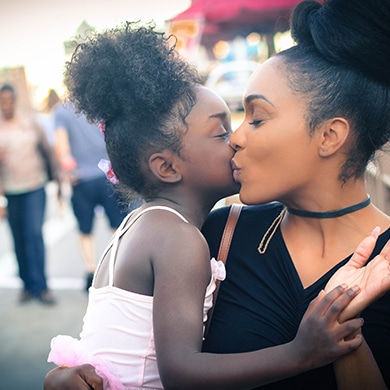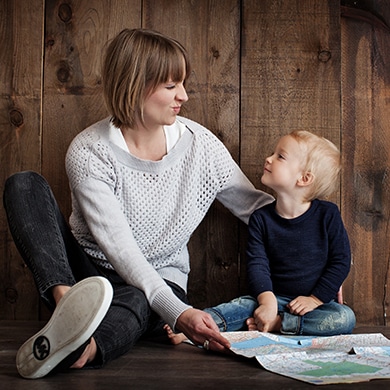

When you bring Law of Attraction practices into your life, you apply them first and foremost to yourself and to your biggest goals. However, the mindset you develop and the techniques you learn also have the potential to improve and enhance your relationships. In particular, if you have children, manifestation work can lead you towards a new, more positive parenting style. This style can be especially effective when dealing with difficult or disappointing behavior.
To implement this approach in your own life, go through the following powerful steps.
First, take a moment to actually summarize (in your own mind) what you think is going wrong with your child’s behavior. This will help you to separate genuinely problematic actions from things that just push your particular buttons or active your defenses… Especially if you’re having a tough day.
For example, you might translate your initial knee-jerk reaction of “My child doesn’t respect me, just like everyone at work!” to “My child isn’t using appropriately respectful language when talking to an adult.”
When your child behaves in a way that upsets your anger, one of the most important things you can do is remember that challenging behavior doesn’t occur in a vacuum. There will be a reason why your child is acting in this way.

Being a positive parent means looking for that reason and using to make constructive choices.
The key thing to remember here is that difficult behavior is telling you about a child’s underlying need. It's a need that isn’t being met, for whatever reason.
If you find the need and address it, you’ll often find that the misbehavior vanishes out of the picture.
So, if (say) your 7-year-old is rudely refusing to help tidy up in the weeks after a new baby arrives, it may be that your older child is envious of the fact your attention is going elsewhere.
If you find ways to show that your love is not finite and that a very special bond still exists between you and the older child, you may notice a much more affable attitude towards tidying.
It’s useful to do some honest self-reflection before approaching your child about any misbehavior. You may find that you have played a role in creating the preconditions for their acting out.
In the example of the new baby mentioned above, the demands and exhaustion associated with a newborn may have meant you really weren’t offering the right amount of attention to your older child.
Knowing something like this (and being able to explain it or apologize for it where appropriate) can help you make more progress in a discussion with your child.
Children have a natural talent for working us up and getting to our deepest emotions, but it’s vital to get those strong feelings in check before actually dealing with a misbehaving child. After all, if you speak to them with impatient or even fury, they will likely give the same behavior right back to you. They may also learn a damaging lesson about what happens if they get things wrong.
To get yourself into the right headspace for discussing things with your kid, look to some of the basic Law of Attraction exercises you already use. For example, a few minutes of deep breathing or creative visualization can work wonders for centering your thoughts and reminding you of what’s important.
Once you’re calm and feel capable of expressing yourself clearly, you can start talking to your child about what happened.
(P.S: You can also get a range of free Law Of Attraction resources that will help you stay calm and positive all the time! Just click here now to get your free copy.)
 Step 5: Take The Opportunity To Teach
Step 5: Take The Opportunity To TeachPart of positive parenting involves finding ways to flip negatives (just as you’ve been learning to do in your everyday thinking). So, view your discussion of your child’s behavior as a way of imparting important lessons, not just reprimanding them for wrongdoing.
Child development experts estimate that you can start doing this properly between the ages of 4 and 6. You can employ the following questions to prompt learning and self-reflection:
Finally, no parent gets it right every time, and it’s important to let go and move on from things you regret. As long as you draw a useful lesson from the experience, you can rest assured you’ll do better in the future. So offer yourself forgiveness in the same way that you are offering it to your child!
Being able to accept your own fallibility in this way also models good behavior to your children, teaching them that they don’t need to be perfect to be loved or valued.
